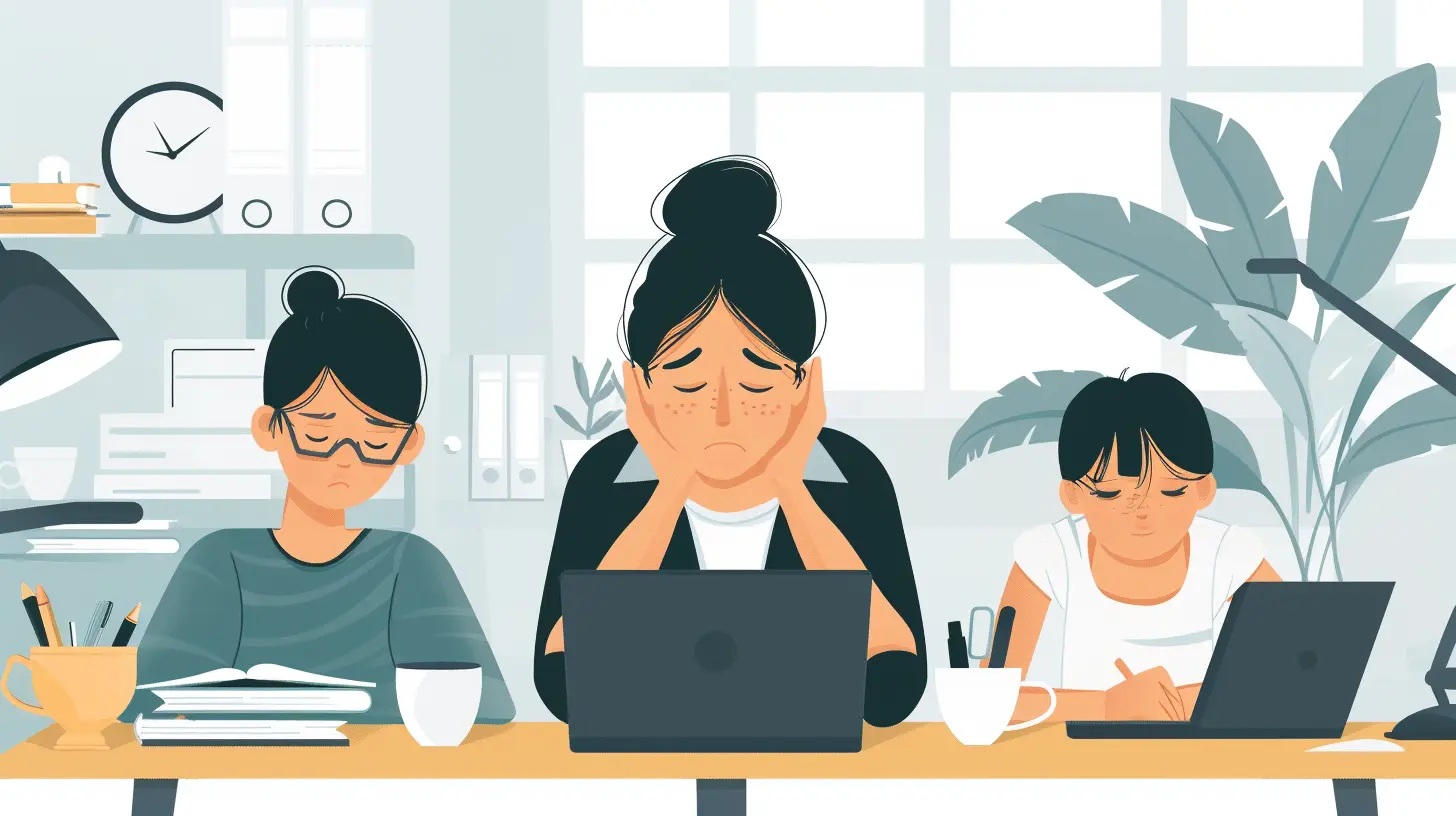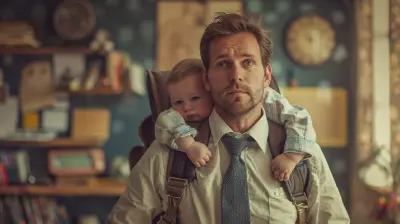The Silent Struggle: How to Recognize Parental Burnout
22 July 2025
Let’s be real—parenting is hard. Rewarding? Absolutely. Heartwarming? Of course. But also completely and utterly exhausting. If you’ve ever found yourself daydreaming about five minutes of uninterrupted silence or hiding in the bathroom just to catch your breath—yep, you’re not alone. What you might not realize, though, is that those feelings can sometimes go beyond typical parenting stress and slip quietly into something more serious: parental burnout.

What Is Parental Burnout?
Parental burnout isn’t just feeling tired after a long day with the kids. It’s a deep, chronic exhaustion that hits you mentally, emotionally, and physically. It’s when the joy of parenting starts to fade, and you find yourself running on autopilot—doing what needs to be done but not really feeling present or connected.Think of it like a smartphone that’s constantly on 1% battery. You keep plugging it in, but it doesn’t really charge because the apps are draining it faster than it can recover. That’s you. That’s burnout.

Why Is Parental Burnout So Hard to Spot?
It’s called “the silent struggle” for a reason. Most parents don’t even realize they’re burnt out. Why? Because there’s this unspoken rule that parenting is supposed to be hard—and talking about how overwhelmed you feel somehow makes you seem like you’re failing. Spoiler alert: You’re not.We're so conditioned to smile through the chaos that we often ignore the signs our body and mind are screaming at us.

The Common Signs of Parental Burnout
So, how do you know if you’re just really tired—or if you’re actually burnt out? Here are some red flags that shouldn’t be ignored:1. Constant Exhaustion That Sleep Doesn’t Fix
We all get tired. But burnout-level tired is a whole new beast. You wake up tired. You go to bed tired. Naps don’t help. Coffee? Useless. You feel like you’re dragging yourself through the day on fumes, and no amount of rest seems to bring you back to life.2. Emotional Numbness or Detachment
You might love your kids, but you don’t feel that warm-and-fuzzy connection anymore. You’re just… there. Going through the motions. Smiling when you think you’re supposed to, but not really feeling it. It’s like watching your own life on mute.3. Feeling Like You’re Failing—Even When You’re Not
Burnout has a nasty way of making you believe you’re not a good parent, no matter how hard you’re trying. You start questioning everything: “Am I doing enough?” “Why can’t I handle this like everyone else?” The self-doubt creeps in and sticks around.4. Irritability and Mood Swings
If you find yourself snapping at the tiniest things—or getting irrationally angry over spilled juice or loud cartoons—you’re not just “moody.” That’s your mind crying out for a break.5. Withdrawal from Social Activities
You used to love playdates, coffee catch-ups, or family gatherings. Now? You cancel plans without a second thought. You don’t have the energy to keep up appearances, and socializing feels like another chore.6. Neglecting Your Own Needs
You can’t remember the last time you did something for yourself—and not because you don’t want to, but because you feel like there’s no time, no energy, and maybe even no point.
What Causes Parental Burnout?
Burnout doesn’t just show up out of nowhere. It’s usually the result of multiple stressors piling up over time. Here are some of the most common culprits:1. Unrealistic Expectations
Trying to be the perfect parent is a one-way ticket to burnout city. Pinterest perfection and Instagram-worthy family moments can set an impossible standard. You're not failing—you're just human.2. Lack of Support
When you feel like you're carrying the parenting load solo, it’s only natural to start feeling overwhelmed. Whether you're a single parent or simply the one who does everything, the burden adds up.3. Work-Life Imbalance
Trying to juggle a career, household duties, and parenting? That’s more than a full-time job. Without balance (or even a little breathing room), something’s gotta give—and it’s often your well-being.4. Children with Special Needs or Challenging Behavior
Parenting always comes with hurdles, but if you’re raising a child with extra needs, the emotional and physical demands can be even higher. You love them fiercely, but you might also feel drained, and that’s okay.5. Lack of “Me Time”
You know that thing called self-care? Yeah, it somehow got pushed to the bottom of the list. When every minute is spent caring for others and never yourself, it’s only a matter of time before the tank runs dry.The Consequences of Ignoring Burnout
Here’s the thing—if left unchecked, parental burnout doesn’t just affect you. It can spill over into your relationships, your work, and your kids' emotional well-being. Chronic burnout can lead to anxiety, depression, and even serious health issues. We’re talking about a domino effect that can get messy real quick.Your patience wears thin. You start snapping more. You feel guilty because you know you're not being your best self—but you also feel stuck. And when that guilt piles up, it becomes another layer of stress.
Let’s not pretend it’s okay to suffer in silence. It’s not just “part of the job.” You matter, too.
How to Cope with Parental Burnout
Good news: burnout is not permanent. But it does require some intentional changes. Here are ways to start reclaiming your peace and sanity:1. Acknowledge It Without Shame
First things first—admit that you’re struggling. There’s no gold medal for pretending everything’s fine. Owning your exhaustion is the first step toward healing.2. Ask for Help
Say it with me: asking for help is not a weakness. Whether it’s your partner, a friend, or a mental health professional—lean on someone. Even a 30-minute break can make a huge difference.3. Lower the Bar
Let go of “perfect.” The kids don’t care if dinner is frozen pizza or if the laundry’s still in a pile on the couch. Focus on what truly matters. Spoiler: it’s not a spotless house.4. Make Time for Yourself Every Day
It doesn’t have to be a spa day (though that would be lovely). Even 10 minutes of reading, walking, journaling, or doing absolutely nothing can recharge your mental battery.5. Establish Boundaries
Say no. Seriously. No to extra obligations. No to overextending. No to guilt-tripping yourself into doing more than you can handle. You can’t pour from an empty cup.6. Connect with Other Parents
Sometimes just hearing “me too” is enough to lighten the weight. Join a parent support group, online forum, or even just chat with a fellow mom or dad at school drop-off. Shared experiences can be incredibly healing.7. Practice Mindfulness
You don’t have to become a meditation guru. But taking a few quiet moments to breathe deeply, ground yourself, and pause can help you feel more centered in the middle of chaos.8. Seek Professional Help If Needed
There’s no shame in reaching out to a therapist or counselor. Mental health matters, and if burnout is severely affecting your life, professional guidance can be a game-changer.The Power of Compassion—For Yourself
Here’s a little reminder: you are doing enough. Even on the days where everything feels like it’s falling apart. Even when you lose your temper. Even when you silently wish for a break. You are doing your best—and that’s more than enough.You wouldn't expect your phone to keep working without charging it, right? So why expect yourself to run full-speed without rest and care?
Parenting doesn’t come with a pause button—but it also doesn’t come with a requirement to suffer silently. Recognizing burnout isn’t admitting defeat. It’s saying, “Hey, I need some space to breathe.” And that’s not just okay—it’s necessary.
Final Thoughts
Parental burnout might be an invisible struggle, but it doesn’t have to be a silent one. If you're reading this and nodding along, feeling seen for the first time in a while—know that you’re not alone. You’re not broken or weak or failing.You're a parent who’s given so much of yourself that your tank is running on empty. And now? It’s time to refill it.
Take that first step—whatever it looks like for you. Whether it’s a nap, a conversation, or just a deep breath in your car. You’ve got this. And more importantly, you don’t have to do it alone.
all images in this post were generated using AI tools
Category:
Parental BurnoutAuthor:

Max Shaffer
Discussion
rate this article
2 comments
Ethan Mason
Thank you for shedding light on such an important topic. Recognizing parental burnout is crucial for our well-being and our children’s. Your insights offer valuable support to those feeling overwhelmed, reminding us that we’re not alone in this journey.
November 19, 2025 at 6:05 PM

Max Shaffer
Thank you for your kind words! I'm glad the article resonated with you and hope it helps many others feel supported.
Remi James
Essential insights! Recognizing burnout is vital for effective parenting.
August 4, 2025 at 2:31 PM

Max Shaffer
Thank you! I'm glad you found the insights valuable. Recognizing burnout is indeed crucial for nurturing both ourselves and our children.


